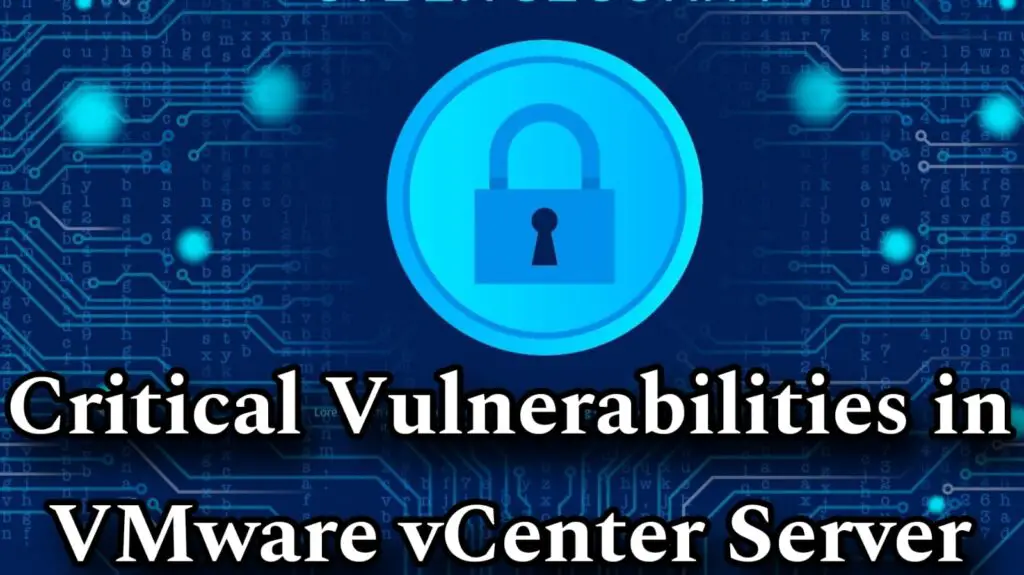Critical Vulnerabilities in VMware vCenter Server

Understanding the Vulnerabilities:
1. Out-of-Bounds Write Vulnerability (CVE-2023-34048):
• Description: The vulnerability resides in the implementation of the DCERPC protocol within vCenter Server.
• Impact: A malicious actor with network access can exploit this flaw, triggering an out-of-bounds write and potentially leading to remote code execution.
• Severity: Critical (CVSSv3 base score: 9.8).
• Known Attack Vectors: Exploitation in the wild has been confirmed.
• Resolution: Apply updates listed in the ‘Fixed Version’ column of the ‘Response Matrix.’
2. Partial Information Disclosure Vulnerability (CVE-2023-34056):
• Description: vCenter Server harbors a partial information disclosure vulnerability.
• Impact: A malicious actor with non-administrative privileges can leverage this vulnerability to access unauthorized data.
• Severity: Moderate (CVSSv3 base score: 4.3).
Impacted Products:
• VMware vCenter Server
• VMware Cloud Foundation
Mitigation Strategies:
1. Out-of-Bounds Write Vulnerability Mitigation:
• Patch Availability: VMware has promptly released patches for vCenter Server 6.7U3, 6.5U3, and VCF 3.x, highlighting the critical severity of the vulnerability.
• Additional Measures: Async vCenter Server patches for VCF 5.x and 4.x deployments are available.
• Acknowledgements: Grigory Dorodnov of Trend Micro Zero Day Initiative reported this issue.
2. Partial Information Disclosure Vulnerability Mitigation:
• Patch Availability: Apply updates listed in the ‘Fixed Version’ column of the ‘Response Matrix’ for the respective vCenter Server versions.
• Acknowledgements: Oleg Moshkov of Deiteriy Lab OÜ reported this issue.
Response Matrix:
Product | Vulnerable | CVE-2023-34048 | CVE-2023-34056 |
VMware vCenter Server 8.0 | 8.0 | 8.0U2 | Not Applicable |
VMware vCenter Server 8.0 | 8.0 | 8.0U1d | Not Applicable |
VMware vCenter Server 7.0 | 7.0 | 7.0U3o | Not Applicable |
VMware Cloud Foundation | 5.x | KB88287 | KB88287 |
VMware Cloud Foundation | 4.x | KB88287 | KB88287 |
Recommended Actions:
1. Apply Updates Promptly:
• Prioritize the application of patches to the affected vCenter Server and Cloud Foundation versions.
• Follow the ‘Response Matrix’ to identify the fixed versions applicable to your deployment.
2. Evaluate Workarounds:
• While in-product workarounds were considered and deemed non-viable, it is crucial to assess alternative strategies based on your specific environment.
3. Review Additional Documentation:
• Refer to the provided FAQ links for additional clarification on the vulnerabilities and the remediation process.
4. Consider Product Lifecycle:
• Although not explicitly mentioned in VMware Security Advisories, the critical severity of CVE-2023-34048 led to the release of patches for older vCenter Server versions. Consider the product lifecycle and plan for upgrades if necessary.
Conclusion:
In the dynamic landscape of cybersecurity, a proactive and vigilant approach to security is imperative. The identified vulnerabilities in VMware vCenter Server underscore the significance of prompt patching and adherence to vendor recommendations. By following the outlined mitigation strategies and recommended actions, organizations can fortify the security posture of their virtual infrastructure, shielding critical assets from potential exploitation.
As we navigate the intricate world of cybersecurity, collaboration between security researchers, vendors, and end-users becomes increasingly crucial. VMware acknowledges the contributions of Grigory Dorodnov and Oleg Moshkov for responsibly reporting these vulnerabilities, emphasizing the importance of a collective effort in securing digital ecosystems.
Remember, cybersecurity is a shared responsibility, and staying informed and proactive is key to mitigating risks and maintaining a robust defense against evolving threats.
Related posts:
- Windows Snip & Sketch/Snipping Tool Vulnerability (CVE-2023-28303)
- VMware Aria Operations for Networks Multiple vulnerabilities
- Windows Secure Kernel Mode Elevation of Privilege Vulnerability
- Script To Disable VMware Horizon Client Auto Update
- Birthday attacks against TLS ciphers with 64bit (Sweet32)
- [Solved] Windows Speculative Execution Configuration Check Vulnerabilities
- [Solved] CVE-2024-12686 BeyondTrust Privileged Remote Access (PRA) and Remote Support (RS) OS Command Injection Vulnerability
- [Solved] CVE-2023-48365 Qlik Sense HTTP Tunneling Vulnerability
- CVE-2025-23040: GitHub Desktop Credential Leak Vulnerability (GHSA-36mm-rh9q-cpqq)
- A Comprehensive Guide to WinGet: The Windows Package Manager

продать аккаунт https://kupit-akkaunt.online
buy business manager account buy-business-manager-verified.org
verified bm business-manager-for-sale.org
buy facebook business manager buy-bm.org